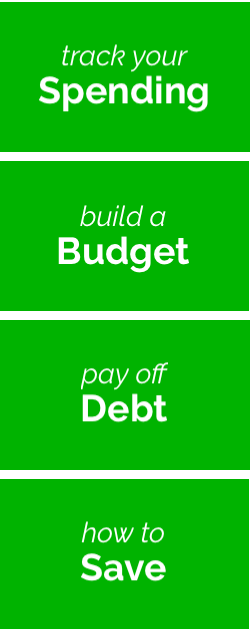The 4 Most Important Keystone Habits In Personal Finance
There are certain habits that make things way easier, these habits are more important than others, these habits are called keystone habits. Keystone habits create a foundation from which you can make even bigger and more positive changes. Mastering the right keystone habit can transform your life.
We have habits everywhere in our lives and we build new habits all the time (both good and bad!). We use these habits to support our daily lives. These habits make our lives easier, you don’t have to think about what you’re doing, it just comes naturally.
Having a solid keystone habit will create a foundation from which you can make even bigger changes. Eating right, getting regular exercise, sleeping eight hours per night, these are all keystone habits that create a solid foundation from which you can make even more positive changes in your life.
The best part about keystone habits is that once they’re established they don’t take much effort to maintain.
When it comes to personal finance there are 4 important keystone habits. Once these habits are established they create a ripple effect through the rest of your personal finances.
If you practice these four keystone habits then there is nothing you can’t achieve with your personal finances!
Keystone Habit #1: Budgeting
Budgeting is an important habit to master. Budgeting helps you make deliberate choices about where and why your money gets spent. When you create a budget, you should evaluate your income and expenses and prioritize where your money goes first. Rarely do we have enough money for everything, so we need to prioritize based on personal values and goals.
Budgeting is an important keystone habit because it helps you evaluate your needs/wants and plan your spending accordingly. Once you get good at budgeting you’ll instantly be able to make new spending decisions that align with your values and goals.
Budgeting is especially important during major life changes like buying a house, starting a family, preparing for retirement, and when you’re just about to retire. During these periods spending will already be in flux so it’s important to keep spending aligned with your goals and values.
At first budgeting will take a lot of mental effort, you might even fail the first few time you try to budget, but once you create a habit it will start to feel natural and won’t take much effort at all. Soon you’ll be saving bags of money without breaking a sweat!
Related: The Simple 50-30-20 Budget
Keystone Habit #2: Tracking Your Spending
Often tracking your spending gets lumped in with budgeting but they’re two very different habits. Budgeting is all about planning whereas tracking your spending is all about execution. Nothing ever goes according to plan so we need to track our spending so that we know when we’re going off course.
Tracking your spending is a keystone habit that provides a tremendous amount of clarity. It helps reinforce good spending habits and highlight bad spending habits.
If you’re not in the habit of tracking your spending then it becomes very difficult to make any meaningful changes to your other spending habits.
Try our automated budget tracker to setup your own budget and tracking system using Google Forms and Google Sheets. This lets you update your spending right from your phone and doesn’t require any 3rd party apps or access to your bank accounts.
The good news is that you don’t need to track your spending constantly. Once you’re in a good routine with your spending, once you’ve established good spending habits, you can forgo detailed tracking for a simpler digital envelope method to manage your income and expenses.
Related: Six Easy Ways To Track Your Spending
Keystone Habit #3: Paying Yourself First
After budgeting and tracking your spending, saving money is the most important financial habit. Saving money should be the first thing you do after you get paid.
At a minimum, you should be saving 10% to 20% of your net income (paying off non-recurring debt counts as saving if you’re not adding more to your debt each month, like student loans for example). Saving 10-20% of your net income makes it possible to achieve your other financial goals. Without a regular savings habit it’s difficult to get ahead.
This is a habit you can practice even when your income is low. It doesn’t matter if you make $1,000 per month or $10,000 per month, paying yourself first is an important keystone habit to practice. Saving even $10-$20 per month on a low income will create a habit that will let you save $1,000-$2,000 per month when your income is higher.
Related: How To Start Saving Money: The 52 Week Challenge
Keystone Habit #4: Investing
Investing is like a super charger for your savings habit. Investing takes your savings and puts them to work. Investing generates passive income that will propel your personal finances to new heights.
A strong investing habit includes regular contributions, regular rebalancing. It also includes an annual review of your risk tolerance, diversification, taxes and fees (both management fees, account fees and trading fees). All this should happen through your investment plan.
Having an investment plan and reviewing it regularly is a keystone personal finance habit that will ensure you maximize your investments. It will help you stay the course during a bear market and ensure you don’t get caught up in the irrational exuberance of a bull market.
Just like saving you can practice this habit with just a small amount of regular investments. I highly encourage everyone to nurture their investing habit, even if it’s just a small amount per month. Some brokers offer free ETF purchases and waive account fees when you make at least 1 trade per quarter. This means you can invest just $20-$50 per quarter and start building your investing habit immediately.
Related: Reduce Your Investment Risk For Little To No Cost
The 4 Most Important Keystone Habits In Personal Finance
When you master these four personal finance habits you’ll create a strong foundation from which you can make even bigger changes to your personal finances!
Practicing these habits will make them second nature. Soon you won’t even know that you’re doing it. It will become easier and easier each time you practice. After just a few months you’ll have a solid base of habits that will create a ripple effect through the rest of your finances.
Join over 250,000 people reading PlanEasy.ca each year. New blog posts weekly!
Tax planning, benefit optimization, budgeting, family planning, retirement planning and more...
Join over 250,000 people reading PlanEasy.ca each year. New blog posts weekly!
Tax planning, benefit optimization, budgeting, family planning, retirement planning and more...






0 Comments